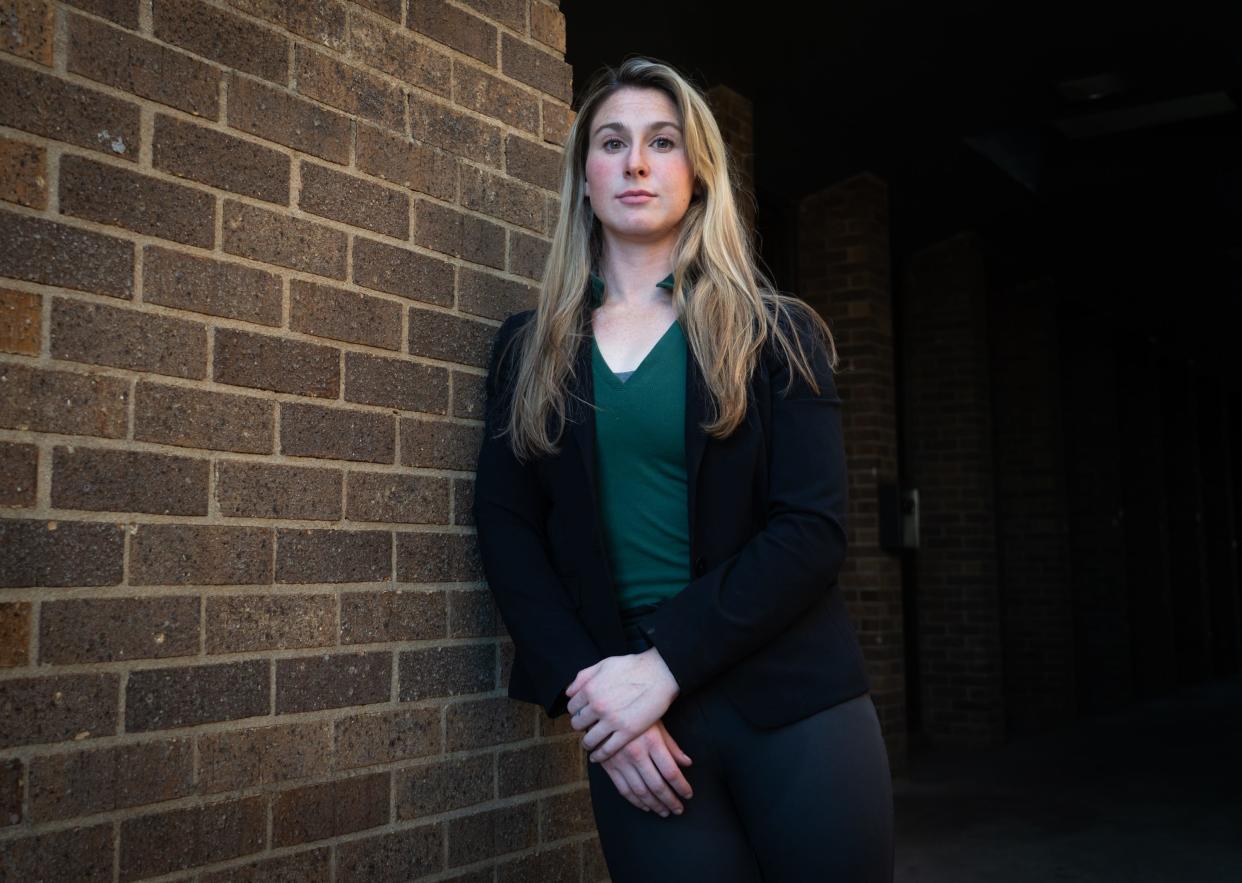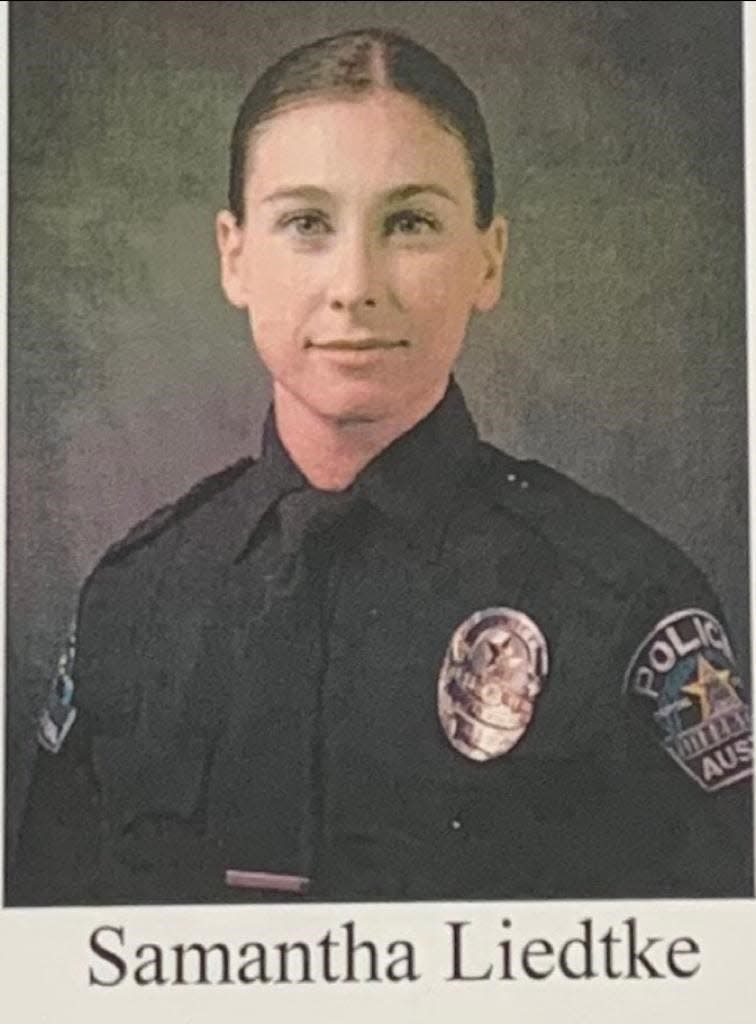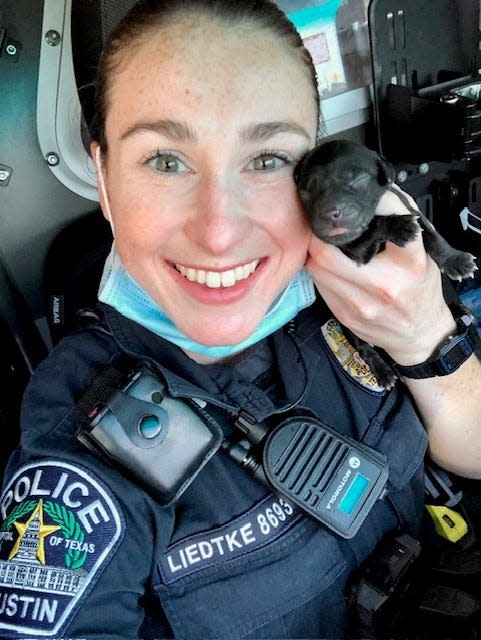Ex-APD officer alleges culture of harassment in lawsuit: 'This was never going to stop'
Editor's note: This story was updated to correct the name of a lawyer representing Samantha Liedtke.
Samantha “Samm” Liedtke was “meek” in college. The kind of person who couldn’t even do a push-up — and definitely not the type to become a police officer.
So she trained. She built up her strength and took up martial arts. While attending the University of Texas, she worked with the local homeless population and for restorative justice organizations, trying to offer healing to victims of crime.
Her passion: being a resource for survivors of domestic violence and sexual assault.
By 2017, she became a dispatcher with the Austin Police Department. Two years later, she enrolled in the police academy. In January 2020, she graduated at the top of her class.
She then began field training. And immediately, she said, the harassment started.
"My first night on field training I was told, ‘There’s two types of female police officers: You’re either a bitch or a slut,’” Liedtke said in an interview, adding that multiple colleagues made similar remarks. “And that mentality and those types of comments were said explicitly or passively pretty much daily for the rest of my time as an Austin police officer.”

Now, she is suing the city of Austin in federal court for gender discrimination, coming “after three months of escalating, gender-based harassment and retaliation” by her colleagues, the lawsuit states, that ultimately led to Liedtke quitting the department.
These tensions stemmed, Liedtke said, from the fact that she was “too compassionate” and wanted to respond to 911 calls, while they didn’t. She said this type of harassment is common for women in the department.
The culture that Liedtke described is not unique to the Austin Police Department, where men outnumber women. A National Institute of Justice report noted in 2019 that “women officers routinely face sexual harassment and discrimination” at departments across the nation.
Meghan Riley, litigation division chief of the city of Austin's Law Department, said in a written statement that the city is aware of the lawsuit and “actively engaged in its legal defense and we will continue to respond to the allegations through the court process.”
Interim Police Chief Robin Henderson declined to address the allegations in the lawsuit but said in a written statement that she takes "these matters very seriously" and values a "diverse and inclusive workforce." The department did not answer questions about Liedtke's allegations sent by the American-Statesman.
"It is important to me that all our employees feel safe and have a way to be heard if they are not being treated in a fair, professional and respectful manner," Henderson said in her statement.
In September, the city filed its response to Liedtke's allegations, denying that discrimination, harassment and retaliation occurred, court documents show.
The Statesman spoke with two people who had prior knowledge about the discrimination Liedtke faced and confirmed various incidents of harassment she claimed. Liedtke's lawsuit did not name any of the men on her shift whom she accused of harassment.
Lawsuit alleges harassment, poor practices by male police officers
For her assigned sector and shift, Liedtke wanted someplace with a high call volume, because she wanted to respond to 911 calls. So she took an evening shift in North Austin, in the area near Rundberg Lane.
Immediately, she said, her training officer made it clear the focus would be on teaching her “how to hunt,” a term for officers finding a vehicle that looks like it could have drugs or guns and following it until the driver makes a traffic violation.
When responding to calls, she said in an interview, her colleagues would often limit her involvement only to frisking women.
During her shifts, she said, her colleagues would regularly ride “Code 4,” which officers use to indicate they have responded to a call but don’t need backup. Liedtke said the colleagues on her shift would use this to sit in a parking lot or to hunt. This meant she was often left responding to calls on their shift without help from other officers.
Liedtke said she had conversations with the shift's sergeant and other members of her shift to address the problem of officers not responding to calls. She was told things would change, but they didn't, she said.
One night, she said, as her colleagues sat in a parking lot while she responded to calls, she posted a message in the department’s internal system urging her colleagues to help her with calls and reminding them that the sergeant had reprimanded the officers for not responding to calls. The lawsuit, which includes a copy of her message, claims the message "touched a nerve" with her male colleagues and spurred their "months-long campaign" of harassing her.

Later that night, the lawsuit said, she encountered two of her colleagues. They berated her, saying she was incompetent because she didn’t get into enough incidents in which she used force to subdue a person, according to a complaint Liedtke filed with the U.S. Equal Employment Opportunity Commission in 2021.
For most of the time, Liedtke’s body-worn camera was not recording because the officers were not doing police work. But at some point, one of the officers opened his car door, which triggered her body camera to start recording.
In the footage given to the Statesman by Liedtke's lawyers, a male officer can be heard admonishing her, saying her message was “disrespectful” and implying that a superior officer would have physically fought her over the comment if she were a man.
“If I sent that to a superior officer, I probably would have been brought back here and told to ‘strip my gear,’” one officer says in the video.
Immediately after that interaction, Liedtke said, she responded to a shooting in progress near their location. Her colleagues didn’t, the lawsuit claims.
A decision to resign
Liedtke said she attempted several times to go through the “proper channels” to address the issues on her shift, but the situation didn't improve.
She tried to switch shifts with another officer, but the commanding officer of the other shift noted that he "did not want a weak woman on his shift," the lawsuit states.
Eventually, Liedtke’s shift got a new sergeant. Liedtke told her the issues she faced. A couple of days later, Liedtke was put on an improvement plan, which placed her back with a field training officer, so she couldn't patrol alone. A reason cited, she said, was that she had “mentality issues.” Her lawsuit claims this was done as “retaliation for making her colleagues look bad by doing her job.”
To put her back on training, the department cited five instances in which she had “made bad tactical decisions that made (her) an officer safety issue.” They included a traffic stop in which Liedtke had let the driver and passengers go, though it was later discovered the car had been stolen and one of the people in the car had a gun.
Liedtke said in an interview that she felt that her sergeant was unjustified in citing the five incidents because they had happened several months before the sergeant was hired and because none of the incidents had resulted in injuries or other adverse outcomes.

A few weeks after being put back on training, she quit.
"I realized this was never going to stop,” Liedtke said. "It was demoralizing, like I had the rug swept out from under me.“
In the weeks after resigning, she filed a complaint with the U.S. Equal Employment Opportunity Commission — which the Statesman reviewed — for her right to sue the department. The complaint's outcome, which came two years later, said the agency would not continue its investigation, although it did not determine the "merit" of Liedtke's complaint. The agency then gave Liedtke the right to sue.
Seeking change
Liedtke said it’s a known secret that women in the department regularly face sexual harassment and discrimination.
“I talked to other female senior female officers, and I'm like, ‘What do I do?’ And essentially, the response is, this is what it is to be a female cop,” Liedtke said.

Currently, the Austin Police Department is looking to bolster its number of women with the 30x30 initiative, which aims to increase women in the academy to 30% by 2030.
In a recent interview for the Austin Police Association’s podcast, Henderson said women make up 10% of the department’s force — below the national average of 12%. Over her 26-year career with the department, she said, there were only “small segments” of that time where she didn’t feel supported.
“APD has been a platform or a catalyst for me to feel as though I’m valued,” Henderson said on the podcast. “When I see the successes females can have at our organization, that’s what drives me.”

Increasing women in the department is a goal Liedtke said she doesn’t think will come true unless changes are made to the department.
If she and the city reach a settlement, Liedtke wants to see policy changes, including that all officers be required to train in Brazilian jiu-jitsu, which she thinks would push officers to defend themselves without “relying on the tools on their belt.”
She wants all officers to take specialized training from the Office of the Attorney General on sexual assault and domestic violence survivors, which is required to be a certified victim advocate.
Her lawyers, Rebecca Webber and Holt Lackey, have also claimed to have asked for monetary damages in the seven figures, but would not disclose that number to the Statesman. Liedtke said that if she wins, she plans to give the money to organizations such as the SAFE Alliance to help survivors of abuse cover costs associated with coming out of a violent relationship, such as relocation.
Liedtke is scheduled to have a jury trial in February 2025.
Since leaving the department, she's returned to police work. She now works as a deputy with the Travis County constable's office in Precinct 5.
“I still wanted to serve survivors of domestic violence and sexual assault," she said.
This article originally appeared on Austin American-Statesman: Former Austin police officer sues city, claims gender discrimination
